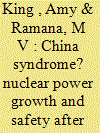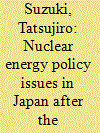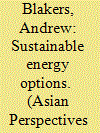|
|
|
Sort Order |
|
|
|
Items / Page
|
|
|
|
|
|
|
| Srl | Item |
| 1 |
ID:
142010


|
|
|
|
|
| Summary/Abstract |
Since the Fukushima disaster in Japan, the Chinese government has undertaken a number of measures to improve the safety of its nuclear facilities while simultaneously committing to a rapid expansion of nuclear power capacity. We explore the tension between these twin commitments, examining China's record of implementation of nuclear safety measures since Fukushima. We investigate how nuclear safety interacts with other priorities in shaping decisions about inland nuclear power stations and nuclear reactor design choice. We find that various safety measures have been implemented since 2011, but where their implementation competes with other priorities— such as the economic interests of local governments and nuclear corporations, and central government energy and development targets—safety is not always the primary concern.
|
|
|
|
|
|
|
|
|
|
|
|
|
|
|
|
| 2 |
ID:
142009


|
|
|
|
|
| Summary/Abstract |
The 2011 Fukushima nuclear accident has become a turning point for Japan, creating loss of public trust not only in nuclear safety but in overall energy policy. More than 80 percent of the public wants to phase out nuclear power eventually. On April 11, 2014, the Japanese government adopted a new National Energy Strategy that declares its intention to reduce dependence on nuclear energy while considering it one of the important base-load electricity sources. Regardless of the future of nuclear energy, Japan needs to face five key policy issues: spent fuel management, plutonium stockpile management, radioactive waste disposal, human resources management, and restoration of public trust. I discuss these critical issues and possible policy alternatives that Japan should pursue.
|
|
|
|
|
|
|
|
|
|
|
|
|
|
|
|
| 3 |
ID:
142012


|
|
|
|
|
| Summary/Abstract |
The Indonesian national nuclear power agency (BATAN) is a classic example of a permanently failing organization that survives due to external support and frequent announcements of imminent construction of a nuclear power plant (NPP). Between 2009 and 2013 BATAN claimed the Slovakian nuclear power industry as its mentoring partner and inspiration in building an NPP in Bangka-Belitung. BATAN failed to mention the scandal-ridden state of the now foreign- owned Slovakian nuclear industry, its catastrophic past, and its nonexistent construction capacity. The Slovakia/Bangka campaign, baseless though it was in reality, functioned as a kind of informational fog of fantasy that deflected attention from domestic critics of an Indonesian nuclear program.
|
|
|
|
|
|
|
|
|
|
|
|
|
|
|
|
| 4 |
ID:
142014


|
|
|
|
|
| Summary/Abstract |
By analyzing the Soviet Politburo's decrees, I seek to reconstruct the blueprint that the Communist Party of the Soviet Union (CPSU) devised for organizing the post–World War II Korean provisional government. The CPSU obstructed the antitrusteeship forces' participation in the US-USSR Joint Commission, aiming to establish a government dominated by the left. Under the Soviet Union's suggested arrangement, the provisional government could exercise legislative and administrative authority only under the Commission's control. Despite believing that rule under a trusteeship would best secure Korea's autonomy, the Soviets did not specify a process for Korea's transition to complete independence.
|
|
|
|
|
|
|
|
|
|
|
|
|
|
|
|
| 5 |
ID:
142013


|
|
|
|
|
| Summary/Abstract |
The Fukushima nuclear disaster in 2011 did not dampen plans by Southeast Asian countries to develop nuclear power plants, despite safety concerns. The strong interest in nuclear power development is being driven by strategic considerations as states view nuclear power as an alternative energy source that can help address the dual objectives of energy security and mitigation of climate change effects. Our article examines the prospects for the Association of Southeast Asian Nations (ASEAN) to build a stronger regional normative framework to promote nuclear safety and security and prevent proliferation of nuclear weapons. In light of ASEAN's vision to establish a political and security community in 2015, we argue that member states that plan to use nuclear energy need to address critical issues such as legislative and regulatory frameworks, human resource development, radioactive waste management, nuclear safety, emergency planning, and security and physical protection.
|
|
|
|
|
|
|
|
|
|
|
|
|
|
|
|
| 6 |
ID:
142008


|
|
|
|
|
| Summary/Abstract |
Solar energy is special: It is vast, ubiquitous, and indefinitely sustainable. The solar resource is much larger than all other available energy resources combined. Solar energy utilizes very common materials; has minimal security and military risks; is available nearly everywhere in vast quantities; and has minimal environmental impact over unlimited time scales. The recent (and continuing) rapid price reduction in photovoltaics and wind energy was not generally foreseen, and is likely to lead to widespread market disruption. New wind and solar photovoltaic (PV) systems are both being deployed around the world in similar scale to new coal, gas, and hydro systems. Renewable energy now constitutes the majority of new generation capacity installed each year. Electricity from wind and PV systems is now cost-competitive with newly built coal, gas, oil, and nuclear generators in many parts of the world. Roof-mounted PV systems successfully compete with conventional gas and electricity for the supply of heat and electricity in cities. Transport and chemical synthesis powered by PV and wind electricity is likely to be competitive in the future.
|
|
|
|
|
|
|
|
|
|
|
|
|
|
|
|
| 7 |
ID:
142011


|
|
|
|
|
| Summary/Abstract |
As more and more information indicates that nuclear power is not economical, energy diversification and greenhouse gas reduction may become the arguments used to justify nuclear energy development. But some countries may wish to gain weapon capabilities through civil programs, as Taiwan (the Republic of China, ROC) did many years ago. Even though Taiwan has no military uses presently in mind, the past still casts a long shadow on those in the field of nuclear energy and is likely to threaten operational safety and risks, placing waste management in disarray. The paradox of promoting versus regulating nuclear power has not been resolved. Over the years, a number of nuclear-related incidents have occurred in Taiwan, demonstrating the importance of having a system of checks and balances, strictly enforced through transparency, domestically and internationally.
|
|
|
|
|
|
|
|
|
|
|
|
|
|
|
|
|
|
|
|
|